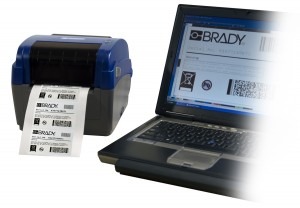
Skin cells from endangered animals grown in tissue culture at London's Institute of Zoology are labelled using Brady's BBP11 printer and stored in liquid nitrogen as part of the Frozen Ark project.
The mission of the Frozen Ark is to save the DNA and viable cells from thousands of rare and endangered mammals, birds, fish, amphibians and invertebrates.
The current worldwide loss of species is largely a result of a human population increase and consequent effects such as global warming.
By preserving cell samples taken from animals in captive breeding programmes, zoos and wild populations, precious information about a species can be saved for future research.
Daphne Green, senior technician at the Institute of Zoology, is involved in growing cells from animal skin samples in tissue culture as part of the Frozen Ark project.
She said: 'The aim of our work is to collect and preserve specimens, mainly from endangered mammals, before these species become extinct.
'By culturing skin cells, we can greatly increase the number of cells available and then divide them into sub-samples ready for freezing in liquid nitrogen.
'Each tube needs to be labelled with detailed information about the sample and we use a Brady system to be sure that our labels remain legible and do not become detached during storage,' added Green.
The BBP11 thermal transfer printer from Brady provides fast 300dpi printing on a range of high-performance label materials.
The printer offers a space-saving small footprint and simple loading, according to Brady.
The Brady labelling software supports database import and 2D or linear barcoding.
Green continued: 'The BBP11 prints very quickly, providing a highly efficient way of producing labels for all the multiple tubes we need to freeze for each animal sample.
'The print quality looks very clear and neat and we can get more information on our labels than before.
'Brady's Freezerbondz labels not only withstand the long-term storage in liquid nitrogen required for samples going into the Frozen Ark, but they can be applied to frozen surfaces.
'This very useful property has enabled us to add labels to some tubes that had been stored with inadequate identification,' she said.
The Frozen Ark, an independent charity, is an international consortium of museums, zoos and laboratories, coordinated by Nottingham University's School of Biology.
The Institute of Zoology, a key member of the consortium, is the research division of the Zoological Society of London and is based within ZSL London Zoo.




